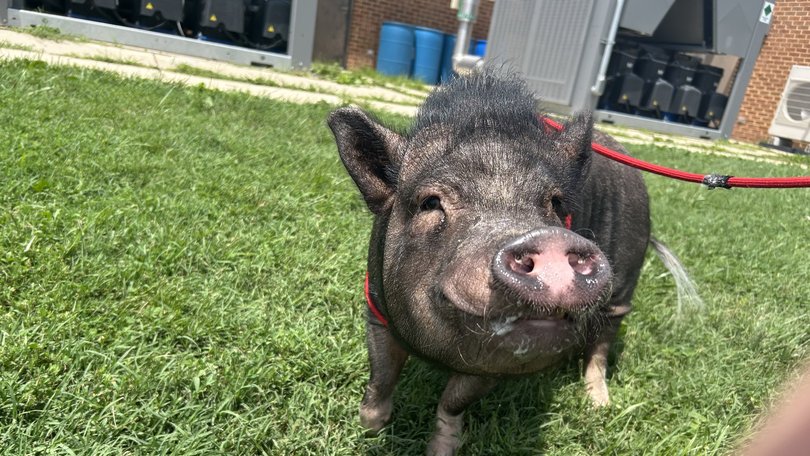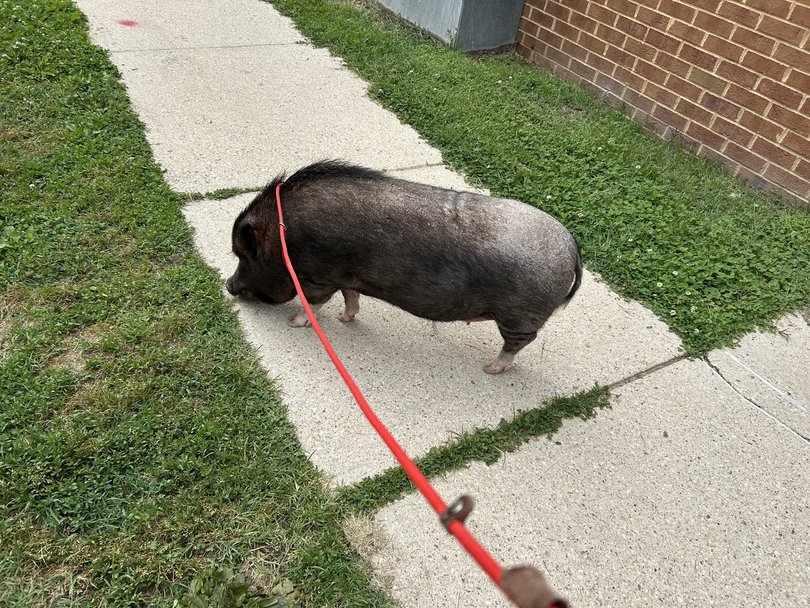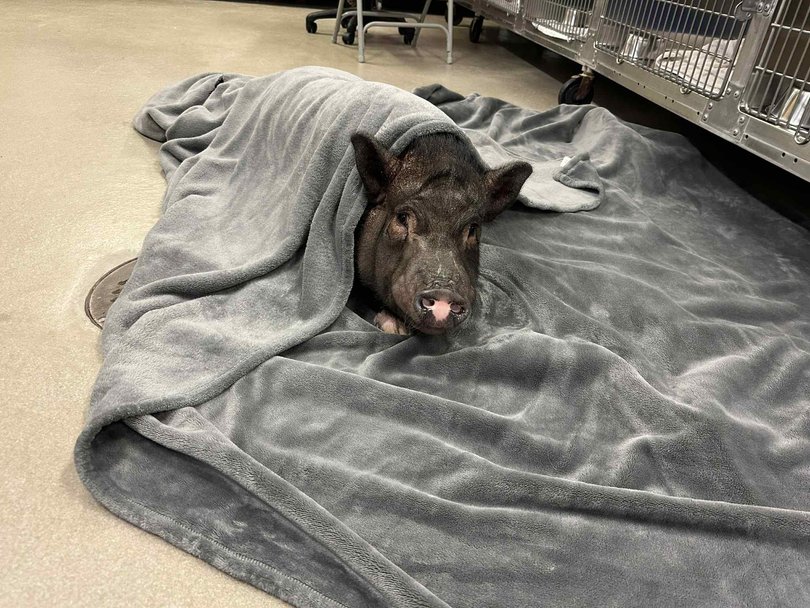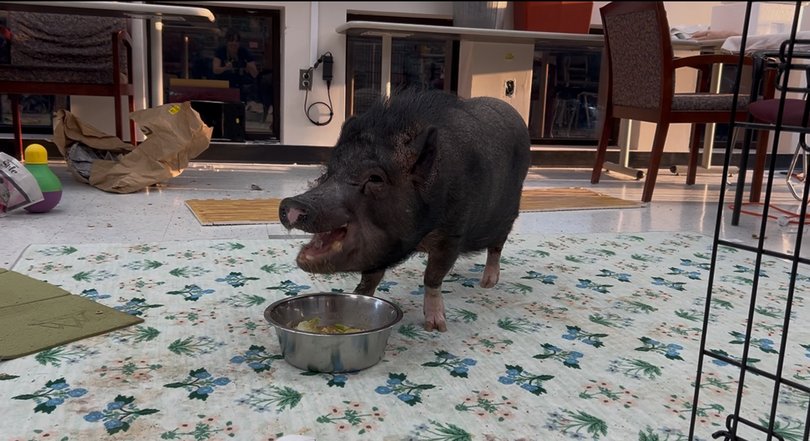How Wellington, a neglected stray pig, found a fan-cooled, blanket-filled forever home

When a 90-pound miniature pig arrived at a Maryland animal shelter in June, staff quickly realised he was different. He behaved more like a dog than a pig.
“He preferred nice, comfy bedding and blankets to straw or hay,” said Amber Guthrie, a behaviour/rescue coordinator at Anne Arundel County Animal Services.
“He preferred to be around the air conditioning or the fan instead of outside.”
Sign up to The Nightly's newsletters.
Get the first look at the digital newspaper, curated daily stories and breaking headlines delivered to your inbox.
By continuing you agree to our Terms and Privacy Policy.They named him Wellington.
Wellington enjoyed being with people and other animals, Ms Guthrie said, and whenever he got excited, he’d wag his tail. He would also sit for a treat, and come when he was called. Staff think he is 3.
“This is not your typical farm pig,” Ms Guthrie said.
Wellington was found roaming the streets of Glen Burnie. Local animal services received a call that a stray pig wandered up to a man’s truck, and officers went to retrieve him and take him to the shelter on June 11.
He showed signs of neglect: skin issues, overgrown hooves and low weight.
“It was bad,” Ms Guthrie said.
Although the shelter has housed farm animals on occasion, “it’s not typical,” said Claudia Roll, the shelter director. Adding to the challenge, Wellington had a big personality.
“He’s a pig that doesn’t want to just live outside on a farm. He really wanted to come inside,” Ms Roll said.
“We’re used to reading body language of dogs and cats, and this was kind of a whole new thing.”
Wellington - whom staff started referring to as “Welly” - was house-trained, comfortable walking on a leash like a dog and could even slip under a blanket to tuck himself in at night. He thrived on affection.

“If I started to scratch his back, he would flop over and show me his tummy, and he would close his eyes and just be so peaceful,” Ms Guthrie said.
“He was a sweetheart.”
Welly would follow staff around and greet other animals at the shelter. When he needed a rest, “he would just settle onto his giant mountain of blankets and observe what was going on and wait for belly rubs,” Ms Guthrie said, noting that she gave him daily massages with mineral oil to improve his dry skin.
“It took a lot of creativity to properly care for this guy,” Ms Roll said.
Wellington slept in the shelter’s training room, and Ms Guthrie installed several cameras to watch him overnight. She set up various enrichment activities to keep him mentally occupied, including a way for him to root for nuts.
“Pigs are known for their intelligence, and he definitely lived up to that,” Ms Guthrie said.
Staff discovered Wellington’s favourite foods included walnuts, watermelon, mandarin oranges, squash, cucumber and romaine lettuce - which shelter volunteers would bring him from their gardens at home. They also learned that he despises bell peppers.
“Bell peppers are considered by him to be disgusting,” Ms Guthrie said.
“But he will do just about anything for walnuts.”
Staff found it difficult to find a home for Welly, Ms Guthrie said. After a few days at the shelter, they sent him to a local rescue farm, but it turned out not to be a fit.
“When he got there, he immediately started looking quite frantic and was looking for how to get out, and he had a cow that chased him and another pig bit his booty,” Ms Guthrie said.
“He was so scared that he busted through their fence and injured himself.”
Wellington returned to the shelter the same day and remained there for seven weeks. The shelter partnered with Eastern Snouts - a national pig rescue organisation based in New Jersey - to help rehome Welly. Gina Mocci, a board member of Eastern Snouts, said Wellington’s case is common.
“The amount of strays we get is unbelievable,” Ms Mocci said.
Ms Mocci explained that pigs can be raised both indoors and outdoors, and whenever Eastern Snouts rescues a pig, they try to keep it in a similar environment to how it was raised. In Wellington’s case, his behaviour showed that he had always been an indoor pig.

“It’s what they’re used to, and we don’t want to shock them,” Ms Mocci said.
Through social media, Eastern Snouts found a match: Mindee Gallagher, who lives on a small farm in Little Meadows, Pennsylvania, with her husband. They have six pigs, four dogs, three goats and numerous chickens.
“Welly’s little face showed up … he was so cute,” Ms Gallagher said.
“We ended up being the lucky people they picked for him.”
On July 31, Ms Guthrie drove Welly six hours to Northeastern Pennsylvania to bring him to his new home.
“He was wonderful the entire ride,” Ms Guthrie said.
“He was on his gigantic dog bed and would snort a little when we went over bumps.”
Ms Gallagher said she knew right away he was meant to live there.
“He’s so funny … he just really wants to be around us, and wants lots of attention,” said Ms Gallagher, who set up a room for Wellington with twinkly lights, pig posters, toys, a radio, a fan and a giant bed. He also has his own outdoor kiddie pool that he cools off in.
“It’s his own little resort.”

Welly is acclimating well to his new home and animal siblings. His favourite activity is sunbathing - Ms Gallagher slathers him in SPF 50 sensitive-skin sunscreen - and snacking on watermelon and Cheerios.
“He’s a good addition to the little rescue that we have,” said Ms Gallagher, who regularly sends Ms Guthrie photo updates.
“I desperately miss him,” Ms Guthrie said.
“He was like my little buddy.”
Staff at the shelter said they feel a void without Wellington, but they are thrilled with where he landed.
“I truly don’t think I could have asked for a better ending for him,” Ms Guthrie said.
“He is so loved already.”
© 2025 , The Washington Post
